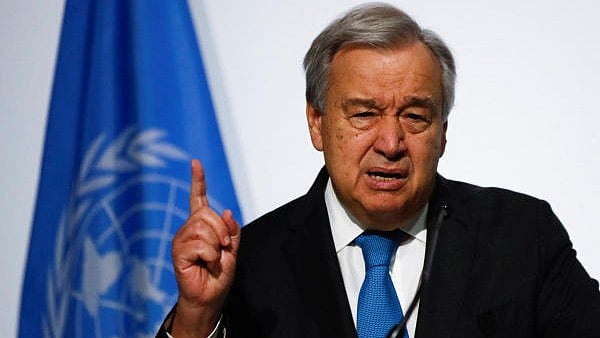
UN Secretary-General Antonio Guterres.
Credit: Reuters Photo
The United Nations Security Council (UNSC) held an emergency meeting Sunday to discuss Iran's attack on Israel, with diplomats urging restraint by all parties to prevent conflict in the region from escalating.
The brazen attack this weekend, when Iran launched a barrage of drones and missiles in retaliation for Israel's attacking its embassy compound in Syria earlier in the month, was the first time Iran had launched open attacks against Israel from its soil.
The attack has unnerved a region already roiling in conflict, raising concerns among diplomats and UN officials that a new, potentially wide and destructive war could spark if both sides don't stand down.
Secretary-General of the UN António Guterres, told the council that it was "time to step back from the brink", and that its members, as well as the United Nations at large, had the collective responsibility "to actively engage all parties concerned to prevent further escalation".
Sunday's meeting was convened at the request of Israel. The council has not collectively issued a statement condemning Iran's attack, and it has also not issued a statement condemning Israel's attack on Iran's embassy in Damascus that killed several senior commanders.
All 15 members of the council must reach a consensus for a statement to be issued, and none was reached on both issues.
The Security Council is one of the few venues where adversaries engaged in conflict come face to face and sit in the same chamber.
On Sunday, both Israel's and Iran's ambassadors were present and delivered fiery comments about the other's country, blaming each other for actions they both called terrorism.
Gilad Erdan, Israel's ambassador, said that Iran's attack had "crossed every red line" and Israel reserved the right to retaliate. Erdan called for the council to take severe action against Iran, including "crippling" sanctions and statements of condemnation.
"The fact that Israel's air defense proved to be superior does not change the brutality of Iran's attack," he said.
Iran's ambassador, Amir Saeid Iravani, said his country had an "inherent right to self-defense" after Israel's attack on its diplomatic compound.
Iravani said that Iran "does not seek escalation or war in the region," but that if its interests, people or national security came under attack, it would "respond to any such threat or aggressions vigorously and in accordance with international law."
The United States and Iran said that they do not seek war with each other, but that if one attacks the other's interests, there would be a defensive response.
Robert Wood, a US representative to the UN, told the Security Council that the "US is not seeking escalation, our actions have been defensive in nature", and said the US goal was to "de-escalate" and then get back to securing an end to the conflict in the Gaza Strip.
Wood said the US planned to bring further action on Iran at the council and called on the council to unequivocally condemn Iran's actions.
Any resolution against Iran put forth by the US at the council would probably be vetoed by Russia and China, two of Iran's close allies, who sharply criticised Israel for what they said was reckless violation of international law when it attacked Iran's embassy compound.
"What happened in the night of the 14th of April did not happen in a vacuum," said Vasily Nebenzya, Russia's Ambassador to the UN.
China's ambassador, Dai Bing, called on the council to "exercise maximum calm and restraint" and said the implementation of an immediate cease-fire is the "top priority".
Israel has said that the embassy compound was a legitimate military target because senior commanders from Iran's Quds Force, the external branch of Iran's Revolutionary Guard, were holding a meeting inside the building.